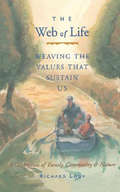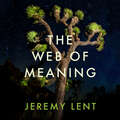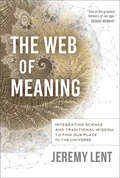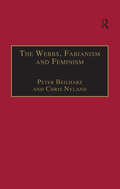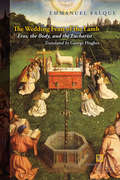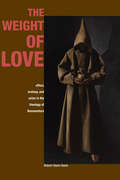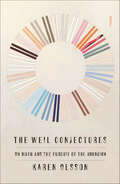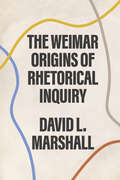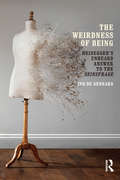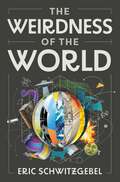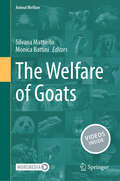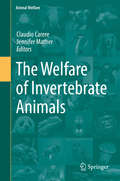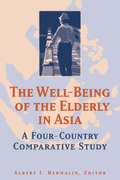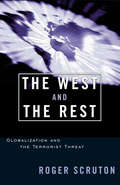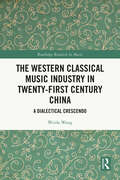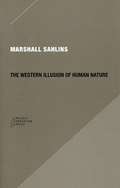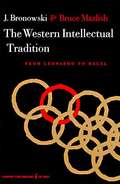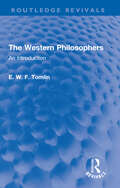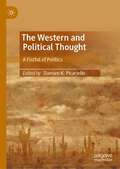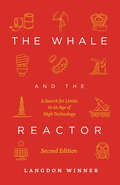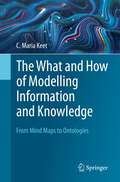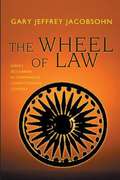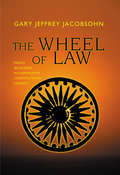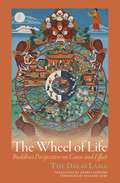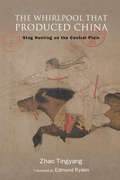- Table View
- List View
The Web of Life: Weaving the Values That Sustain Us
by Richard LouvWith great warmth and wisdom, award-winning journalist Richard Louv explores the delicate strands of our lives: family, friendship, community, nature, time, and spirit.
The Web of Meaning: Integrating Science and Traditional Wisdom to Find Our Place in the Universe
by Jeremy Lent'The Web of Meaning is both a profound personal meditation on human existence and a tour-de-force weaving together of historic and contemporary world-wide secular and spiritual thought on the deepest question of all: why are we here?' Gabor Maté M.D., author, In The Realm of Hungry Ghosts: Close Encounters With Addiction'We need, now more than ever, to figure out how to make all kinds of connections. This book can help--and therefore it can help with a lot of the urgent tasks we face.' Bill McKibben, author, Falter: Has the Human Game Begun to Play Itself Out?As our civilization careens towards a precipice of climate breakdown, ecological destruction and gaping inequality, people are losing their existential moorings. Our dominant worldview of disconnection, which tells us we are split between mind and body, separate from each other, and at odds with the natural world, has passed its expiration date.Yet another world is possible.Award-winning author, Jeremy Lent, investigates humanity's age-old questions - who am I? why am I? how should I live? - from a fresh perspective, weaving together findings from modern systems thinking, evolutionary biology and cognitiveneuroscience with insights from Buddhism, Taoism and indigenous wisdom.The result is a breathtaking accomplishment: a rich, coherent worldview based on a deep recognition of connectedness within ourselves, between each other, and with the entire natural world.
The Web of Meaning: Integrating Science and Traditional Wisdom to Find Our Place in the Universe
by Jeremy Lent&“A profound personal meditation on human existence . . . weaving together . . . historic and contemporary thought on the deepest question of all: why are we here?&” —Gabor Maté M.D., author, In the Realm of Hungry Ghosts As our civilization careens toward climate breakdown, ecological destruction, and gaping inequality, people are losing their existential moorings. The dominant worldview of disconnection, which tells us we are split between mind and body, separate from each other, and at odds with the natural world, has been invalidated by modern science. Award-winning author Jeremy Lent, investigates humanity&’s age-old questions—Who am I? Why am I? How should I live?—from a fresh perspective, weaving together findings from modern systems thinking, evolutionary biology, and cognitive neuroscience with insights from Buddhism, Taoism, and Indigenous wisdom. The result is a breathtaking accomplishment: a rich, coherent worldview based on a deep recognition of connectedness within ourselves, between each other, and with the entire natural world. It offers a compelling foundation for a new philosophical framework that could enable humanity to thrive sustainably on a flourishing Earth.The Web of Meaning is for everyone looking for deep and coherent answers to the crisis of civilization. &“One of the most brilliant and insightful minds of our age, Jeremy Lent has written one of the most essential and compelling books of our time.&” —David Korten, author, When Corporations Rule the World and The Great Turning: From Empire to Earth Community &“We need, now more than ever, to figure out how to make all kinds of connections. This book can help—and therefore it can help with a lot of the urgent tasks we face.&” —Bill McKibben, author, Falter: Has the Human Game Begun to Play Itself Out?
The Webbs, Fabianism and Feminism: Fabianism and the Political Economy of Everyday Life (Avebury Series in Philosophy)
by Peter Beilharz Chris NylandThis book seeks to explore the understanding of Fabianism of both the Webbs and the Fabian Women’s Group and how this understanding shaped their views regarding such gender-centred issues as the family wage; protective labour law; and women’s place in the welfare state, the home and the labour market.
The Wedding Feast of the Lamb: Eros, the Body, and the Eucharist (Perspectives in Continental Philosophy)
by Emmanuel FalqueEmmanuel Falque's The Wedding Feast of the Lamb represents a turning point in his thought. Here, Falque links philosophy and theology in an original fashion that allows us to see the full effect of theology's "backlash" against philosophy. By attending closely to the incarnation and the eucharist, Falque develops a new concept of the body and of love: By avoiding the common mistake of "angelism"--consciousness without body--Falque considers the depths to which our humanity reflects animality, or body without consciousness. He shows the continued relevance of the question "How can this man give us his flesh to eat?" (John 6:52), especially to philosophy. We need to question the meaning of "this is my body" in "a way that responds to the needs of our time" (Vatican II). Because of the ways that "Hoc est corpus meum" has shaped our culture and our modernity, this is a problem both for religious belief and for culture.
The Weight of Love: Affect, Ecstasy, and Union in the Theology of Bonaventure
by Robert Glenn DavisSupplementing theological interpretation with historical, literary, and philosophical perspectives, The Weight of Love analyzes the nature and role of affectivity in medieval Christian devotion through an original interpretation of the writings of the Franciscan theologian Bonaventure. It intervenes in two crucial developments in medieval Christian thought and practice: the renewal of interest in the corpus of Dionysius the Areopagite in thirteenth-century Paris and the proliferation of new forms of affective meditation focused on the passion of Christ in the later Middle Ages. Through the exemplary life and death of Francis of Assisi, Robert Glenn Davis examines how Bonaventure traces a mystical itinerary culminating in the meditant’s full participation in Christ’s crucifixion. For Bonaventure, Davis asserts, this death represents the becoming-body of the soul, the consummation and transformation of desire into the crucified body of Christ.In conversation with the contemporary historiography of emotions and critical theories of affect, The Weight of Love contributes to scholarship on medieval devotional literature by urging and offering a more sustained engagement with the theological and philosophical elaborations of affectus. It also contributes to debates around the “affective turn” in the humanities by placing it within this important historical context, challenging modern categories of affect and emotion.
The Weil Conjectures: On Math and the Pursuit of the Unknown
by Karen OlssonA New York Times Editors' Pick and Paris Review Staff Pick"A wonderful book." --Patti Smith"I was riveted. Olsson is evocative on curiosity as an appetite of the mind, on the pleasure of glutting oneself on knowledge." --Parul Sehgal, The New York TimesAn eloquent blend of memoir and biography exploring the Weil siblings, math, and creative inspirationKaren Olsson’s stirring and unusual third book, The Weil Conjectures, tells the story of the brilliant Weil siblings—Simone, a philosopher, mystic, and social activist, and André, an influential mathematician—while also recalling the years Olsson spent studying math. As she delves into the lives of these two singular French thinkers, she grapples with their intellectual obsessions and rekindles one of her own. For Olsson, as a math major in college and a writer now, it’s the odd detours that lead to discovery, to moments of insight. Thus The Weil Conjectures—an elegant blend of biography and memoir and a meditation on the creative life.Personal, revealing, and approachable, The Weil Conjectures eloquently explores math as it relates to intellectual history, and shows how sometimes the most inexplicable pursuits turn out to be the most rewarding.
The Weimar Origins of Rhetorical Inquiry
by David L. MarshallThe Weimar origins of political theory is a widespread and powerful narrative, but this singular focus leaves out another intellectual history that historian David L. Marshall works to reveal: the Weimar origins of rhetorical inquiry. Marshall focuses his attention on Martin Heidegger, Hannah Arendt, Walter Benjamin, and Aby Warburg, revealing how these influential thinkers inflected and transformed problems originally set out by Max Weber, Carl Schmitt, Theodor Adorno, Hans Baron, and Leo Strauss. He contends that we miss major opportunities if we do not attend to the rhetorical aspects of their thought, and his aim, in the end, is to lay out an intellectual history that can become a zone of theoretical experimentation in para-democratic times. Redescribing the Weimar origins of political theory in terms of rhetorical inquiry, Marshall provides fresh readings of pivotal thinkers and argues that the vision of rhetorical inquiry that they open up allows for new ways of imagining political communities today.
The Weirdness of Being: Heidegger's Unheard Answer to the Seinsfrage
by Ivo De GennaroThe ongoing publication of Heidegger's complete works has called into question the interpretive and translative practices that have historicized Heidegger's thinking through the adaptation of categories and mind-sets inherited from metaphysics. Ivo De Gennaro argues that the posthumous treatises in particular - many of which have yet to be translated into English - show that the "other onset of thinking" that Being and Time inaugurated and which those historicizing accounts have interpreted and translated away, has already taken place. This book, on the other hand, speaks solely from that other onset, that of being itself. While arguing the "one-pointedness" of Heidegger's entire path of thinking, De Gennaro draws mainly on the posthumous treatises to offer both a provisional exploration of, and an introduction to, a thinking whose sense and implications have barely begun to emerge. This challenging and original interpretation marks an important contribution to Heidegger scholarship.
The Weirdness of the World
by Eric SchwitzgebelHow all philosophical explanations of human consciousness and the fundamental structure of the cosmos are bizarre—and why that&’s a good thingDo we live inside a simulated reality or a pocket universe embedded in a larger structure about which we know virtually nothing? Is consciousness a purely physical matter, or might it require something extra, something nonphysical? According to the philosopher Eric Schwitzgebel, it&’s hard to say. In The Weirdness of the World, Schwitzgebel argues that the answers to these fundamental questions lie beyond our powers of comprehension. We can be certain only that the truth—whatever it is—is weird. Philosophy, he proposes, can aim to open—to reveal possibilities we had not previously appreciated—or to close, to narrow down to the one correct theory of the phenomenon in question. Schwitzgebel argues for a philosophy that opens.According to Schwitzgebel&’s &“Universal Bizarreness&” thesis, every possible theory of the relation of mind and cosmos defies common sense. According to his complementary &“Universal Dubiety&” thesis, no general theory of the relationship between mind and cosmos compels rational belief. Might the United States be a conscious organism—a conscious group mind with approximately the intelligence of a rabbit? Might virtually every action we perform cause virtually every possible type of future event, echoing down through the infinite future of an infinite universe? What, if anything, is it like to be a garden snail? Schwitzgebel makes a persuasive case for the thrill of considering the most bizarre philosophical possibilities.
The Welfare of Goats (Animal Welfare #25)
by Silvana Mattiello Monica BattiniThis book focuses exclusively on the welfare of goats, which have peculiar behavioral characteristics and needs, and distinct individual personalities. Despite the many differences between goats and sheep, welfare and health issues of small ruminants have often been addressed together. Goats are extremely adaptable, now widespread and farmed all over the world. Usually bred for economic purposes (milk, meat and/or fibre), goats are also occasionally kept as pet animals, in educational farms, in zoos or for animal-assisted therapy. This wide range of conditions may elicit different challenges for their welfare. Readers of this volume are introduced to the goat species, starting from its origin and domestication process, and presentation of its natural behaviour and characteristics, including recent data on goats’ ability to communicate, cognition capabilities and personality. Knowledge of these features is indispensable to allow a welfare-friendly approach to goat management. The authors then address all relevant aspects of goat welfare, covering issues related to housing, feeding, painful procedures and end-of-life management, with special emphasis on welfare challenges in adverse environments. An additional chapter is dedicated to the main health problems that can jeopardize goats’ welfare. Finally, this volume highlights the latest research to on-farm welfare assessment with indicators and protocols for evaluation. This work will appeal to scholars of animal welfare science and biology, stakeholders in the livestock industry, as well as experts in goat-assisted interventions and pet owners. Video and audio files enrich the reading experience and can also be played from the print book using the free Springer Nature More Media app.
The Welfare of Invertebrate Animals (Animal Welfare #18)
by Jennifer Mather Claudio CarereThis book is devoted to the welfare of invertebrates, which make up 99% of animal species on earth. Addressing animal welfare, we do not often think of invertebrates; in fact we seldom consider them to be deserving of welfare evaluation. And yet we should. Welfare is a broad concern for any animal that we house, control or utilize – and we utilize invertebrates a lot. The Authors start with an emphasis on the values of non-vertebrate animals and discuss the need for a book on the present topic. The following chapters focus on specific taxa, tackling questions that are most appropriate to each one. What is pain in crustaceans, and how might we prevent it? How do we ensure that octopuses are not bored? What do bees need to thrive, pollinate our plants and give us honey? Since invertebrates have distinct personalities and some social animals have group personalities, how do we consider this? And, as in the European Union’s application of welfare consideration to cephalopods, how do the practical regulatory issues play out?We have previously relegated invertebrates to the category ‘things’ and did not worry about their treatment. New research suggest that some invertebrates such as cephalopods and crustaceans can have pain and suffering, might also have consciousness and awareness. Also, good welfare is going to mean different things to spiders, bees, corals, etc. This book is taking animal welfare in a very different direction. Academics and students of animal welfare science, those who keep invertebrates for scientific research or in service to the goals of humans, as well as philosophers will find this work thought-provoking, instructive and informative.
The Well-Being of the Elderly in Asia: A Four-Country Comparative Study
by Albert I. HermalinThe past two decades have witnessed rapid social, economic, and demographic change in East and South-East Asia. The older populations in these regions have been increasing faster than in the West, and the proportions of people over sixty will more than double over the next thirty years. Increased urbanization and educational levels and a strong shift to professional, technical, manufacturing, and service occupations are changing the social and economic landscape, leading to concern for the well-being of the elderly, who traditionally have relied on the family for support. Governments are attempting to preserve these traditions while taking into account widespread family change and new expectations for pension, health insurance, and other public programs. The contributors to this volume use survey and other data collected over ten years to examine the well-being of the current older population in four Asian countries: The Philippines, Singapore, Taiwan, and Thailand. Each major analytic chapter looks at a key dimension of well-being--economic, physical and mental health, work and leisure--and how these are affected by the familial and social support arrangements, as well as age, gender, education, and urban-rural residence. Where possible, changes over time are traced. Explicit attention is given to the policies and programs in place and under development in each country and to the cultural accommodations underway. The contributors also look ahead to the implications of the large numbers of elderly with very different characteristics who will predominate in the coming years and to the policy implications of this coming transformation. The book will be important for scholars and policymakers whose work involves population in Asia, including demographers, sociologists, and economists.
The West and the Rest: Globalization and the Terrorist Threat
by Roger ScrutonScruton shows how the different religious and philosophical roots of Western and Islamic societies have resulted in those societies’ profoundly divergent beliefs about the nature of political order. For one thing, the idea of the social contract, crucial to the self-conception of Western nations, is entirely absent in Islamic societies. Similarly, Scruton explains why the notions of territorial jurisdiction, citizenship, and the independent legitimacy of secular authority and law are both specifically Western and fundamentally antipathetic to Islamic thought.And yet, says Scruton, for its adherents Islam provides amply for one of the most fundamental of human needs: the need for membership. In contrast, the decay of the West’s own political vision, and its concomitant preoccupation with individual choice, has finally led to a “culture of repudiation” in which that need goes increasingly unfulfilled, principally because the sources of its fulfillment—patriotism, religious belief, traditional ways of life—are routinely mocked.Globalization has made these facts an explosive mixture. Migration, modern communications, and the media have inexorably brought the formerly remote inhabitants of Islamic nations into constant contact with the images, products, and peoples of secular, liberal democracies. Scruton warns that in light of this new reality, certain Western assumptions—about consumption and prosperity, about borders and travel, about free trade and multinational corporations, and about multiculturalism—need to be thoroughly re-evaluated. The West and the Rest is a major contribution to the West’s public discourse about terrorism, civil society, and liberal democracy.
The Western Classical Music Industry in Twenty-First Century China: A Dialectical Crescendo (Routledge Research in Music)
by Weida WangWeida Wang explores how Western classical music (WCM) has become increasingly popular in China, framing the industry as a complex entity intricately embedded within China’s political landscape, cultural economy, and cultural industries. Wang highlights how authorities and organisers strive to build powerful brands to support the industry’s growth, aiming to tap into the vast domestic market and showcase China’s achievements in WCM on the global stage as part of broader cultural diplomacy efforts. The study delves into the mechanisms and underlying logics driving the rapid expansion of the WCM market in contemporary China.With the rise of China’s economy since its government’s late-1970s economic and political reform, WCM has become a useful tool for showcasing changes to the image of ‘modern’ and ‘contemporary’ China. At the same time, a new Chinese middle class, following the rapid economic (and cultural) development in China’s coastal cities, has also emerged, becoming a substantial demographic involved in the learning, appreciation, and consumption of WCM. Especially in the past 20 years, a new WCM scene has developed quickly and established as an industry in China; one critically enmeshed in both the business and political worlds. Many ground-breaking cultural events have taken place in the last decades. These have shown themselves to be huge forces behind the development of China’s domestic (and fledgling international) classical music aspirations.The book will be valuable for those interested in arts/music management, music industry studies, China studies, cultural and creative industry studies, and ethnomusicology.
The Western Illusion of Human Nature: With Reflections on the Long History of Hierarchy, Equality, and the Sublimation of Anarchy in the West, and Comparative Notes on Other Conceptions of the Human Condition
by Marshall SahlinsReflecting the decline in college courses on Western Civilization, Marshall Sahlins aims to accelerate the trend by reducing "Western Civ" to about two hours. He cites Nietzsche to the effect that deep issues are like cold baths; one should get into and out of them as quickly as possible. The deep issue here is the ancient Western specter of a presocial and antisocial human nature: a supposedly innate self-interest that is represented in our native folklore as the basis or nemesis of cultural order. Yet these Western notions of nature and culture ignore the one truly universal character of human sociality: namely, symbolically constructed kinship relations. Kinsmen are members of one another: they live each other's lives and die each other's deaths. But where the existence of the other is thus incorporated in the being of the self, neither interest, nor agency or even experience is an individual fact, let alone an egoistic disposition. "Sorry, beg your pardon," Sahlins concludes, Western society has been built on a perverse and mistaken idea of human nature.
The Western Intellectual Tradition: From Leonardo to Hegel
by Jacob Bronowski Bruce MazlishThe history of science has been successfully integrated with other intellectual and political developments in the Western tradition, instead of being cut off as a recondite specialty untouched by the humanists. The method used by Brunswick and Mazlish is to select twenty-five or more key persons or events and to weave the whole chronicle of Western thought from Leonardo to Hegel (inclusive) around them. Their work is therefore less abstract than some histories of thought of a similar compass, since it does not hesitate to deal with specific persons and even political events: intellectual history is not reduced to themes and elements. The individual chapters, since they are really examples, present the newest learned evidence with some detail and even indicate the scholarly controversies that are involved. References to the learned literature in these essays are invariably apt.
The Western Philosophers: An Introduction (Routledge Revivals)
by E. W. TomlinFirst published in 1950, The Western Philosophers presents the life of philosophical thought in the Western world. From Socrates to Spinoza, from John Locke to Nietzsche, the author gives a good introduction for anyone who is wondering what philosophy is about and provides an initiation into the subject. The author argues that philosophy is not simply the collective works of great philosophers. Philosophy is an attitude of mind; at bottom it is nothing but that irrepressible impulse towards enquiry, that itch to probe at the meaning of things, which is the spur behind science itself. This book is an essential read for students of Philosophy.
The Western and Political Thought: A Fistful of Politics
by Damien K. PicarielloThe Western and Political Thought: A Fistful of Politics offers a variety of engaging and entertaining answers to the question: What do Westerns have to do with politics? This collection features contributions from scholars in a variety of fields—political science, English, communication studies, and others—that explore the connections between Westerns (prose fiction, films, television series, and more) and politics.
The Whale and the Reactor: A Search for Limits in an Age of High Technology, Second Edition
by Langdon Winner“In an age in which the inexhaustible power of scientific technology makes all things possible, it remains to be seen where we will draw the line, where we will be able to say, here are possibilities that wisdom suggest we avoid.” First published to great acclaim in 1988, Langdon Winner’s groundbreaking exploration of the political, social, and philosophical implications of technology is timelier than ever. He demonstrates that choices about the kinds of technical systems we build and use are actually choices about who we want to be and what kind of world we want to create—technical decisions are political decisions, and they involve profound choices about power, liberty, order, and justice. A seminal text in the history and philosophy of science, this new edition includes a new chapter, preface, and postscript by the author.
The What and How of Modelling Information and Knowledge: From Mind Maps to Ontologies
by C. Maria KeetThe main aim of this book is to introduce a group of models and modelling of information and knowledge comprehensibly. Such models and the processes for how to create them help to improve the skills to analyse and structure thoughts and ideas, to become more precise, to gain a deeper understanding of the matter being modelled, and to assist with specific tasks where modelling helps, such as reading comprehension and summarisation of text. The book draws ideas and transferrable approaches from the plethora of types of models and the methods, techniques, tools, procedures, and methodologies to create them in computer science. This book covers five principal declarative modelling approaches to model information and knowledge for different, yet related, purposes. It starts with entry-level mind mapping, to proceed to biological models and diagrams, onward to conceptual data models in software development, and from there to ontologies in artificial intelligence and all the way to ontology in philosophy. Each successive chapter about a type of model solves limitations of the preceding one and turns up the analytical skills a notch. These what-and-how for each type of model is followed by an integrative chapter that ties them together, comparing their strengths and key characteristics, ethics in modelling, and how to design a modelling language. In so doing, we’ll address key questions such as: what type of models are there? How do you build one? What can you do with a model? Which type of model is best for what purpose? Why do all that modelling? The intended audience for this book is professionals, students, and academics in disciplines where systematic information modelling and knowledge representation is much less common than in computing, such as in commerce, biology, law, and humanities. And if a computer science student or a software developer needs a quick refresher on conceptual data models or a short solid overview of ontologies, then this book will serve them well.
The Wheel of Law: India's Secularism in Comparative Constitutional Context
by Gary Jeffrey JacobsohnHow can religious liberty be guaranteed in societies where religion pervades everyday life? In The Wheel of Law, Gary Jacobsohn addresses this dilemma by examining the constitutional development of secularism in India within an unprecedented cross-national framework that includes Israel and the United States. He argues that a country's particular constitutional theory and practice must be understood within its social and political context. The experience of India, where religious life is in profound tension with secular democratic commitment, offers a valuable perspective not only on questions of jurisprudence and political theory arising in countries where religion permeates the fabric of society, but also on the broader task of ensuring religious liberty in constitutional polities. India's social structure is so entwined with religion, Jacobsohn emphasizes, that meaningful social reform presupposes state intervention in the spiritual domain. Hence India's "ameliorative" model of secular constitutionalism, designed to ameliorate the disabling effects of the caste system and other religiously based practices. Jacobsohn contrasts this with the "visionary" secularism of Israel, where the state identifies itself with a particular religion, and with America's "assimilative" secularism. Constitutional globalization is as much a reality as economic globalization, Jacobsohn concludes, and within this phenomenon the place of religion in liberal democracy is among the most vexing challenges confronting us today. A richly textured account of the Indian experience with secularism, developed in a broad comparative framework, this book is for all those seeking ways to respond to this challenge.
The Wheel of Law: India's Secularism in Comparative Constitutional Context
by Gary Jeffrey JacobsohnHow can religious liberty be guaranteed in societies where religion pervades everyday life? In The Wheel of Law, Gary Jacobsohn addresses this dilemma by examining the constitutional development of secularism in India within an unprecedented cross-national framework that includes Israel and the United States. He argues that a country's particular constitutional theory and practice must be understood within its social and political context. The experience of India, where religious life is in profound tension with secular democratic commitment, offers a valuable perspective not only on questions of jurisprudence and political theory arising in countries where religion permeates the fabric of society, but also on the broader task of ensuring religious liberty in constitutional polities. India's social structure is so entwined with religion, Jacobsohn emphasizes, that meaningful social reform presupposes state intervention in the spiritual domain. Hence India's "ameliorative" model of secular constitutionalism, designed to ameliorate the disabling effects of the caste system and other religiously based practices. Jacobsohn contrasts this with the "visionary" secularism of Israel, where the state identifies itself with a particular religion, and with America's "assimilative" secularism. Constitutional globalization is as much a reality as economic globalization, Jacobsohn concludes, and within this phenomenon the place of religion in liberal democracy is among the most vexing challenges confronting us today. A richly textured account of the Indian experience with secularism, developed in a broad comparative framework, this book is for all those seeking ways to respond to this challenge.
The Wheel of Life: Buddhist Perspectives on Cause and Effect
by Dalai Lama Jeffrey Hopkins Richard GereUsing the traditional Buddhist allegorical image of the Wheel of Life and the teaching of the twelve links of dependent origination, the Dalai Lama deftly illustrates how our existence, though fleeting and often full of woes, brims with the potential for peace and happiness. We can realize that potential by cultivating a wise appreciation of the interdependency of actions and experience, and by living a kind and compassionate life. A life thus lived, the Dalai Lama teaches, becomes thoroughly meaningful for both oneself and for others.
The Whirlpool That Produced China: Stag Hunting on the Central Plain (SUNY series in Chinese Philosophy and Culture)
by Tingyang ZhaoIn The Whirlpool That Produced China, Tingyang Zhao offers a philosophical interpretation of China's historicity, explaining how the expansion of China was not due to the lures of expansionist behavior but to the offerings of the surrounding contenders as they were constantly being pulled into a whirlpool of growth and amalgamation. The peoples surrounding China on all four sides sought to win the greatest material benefits and greatest spiritual resources by shaping their ways of thinking and living around the evolving core culture of the central plains. Zhao also investigates how the tianxia vision of world order was able to dissolve the fierce currents of contention and create out of them the inclusive model of many cultures and many peoples with many forms of governance. He explains these reasons for why China became China by weaving together ontology with game theory methodology: the "stag hunt." Ultimately, Zhao addresses the question of how ancient China became such an irresistible attraction—a stag—to its vital periphery that once a population and territory was drawn into the game, or the whirlpool, it was difficult if not impossible to withdraw.
